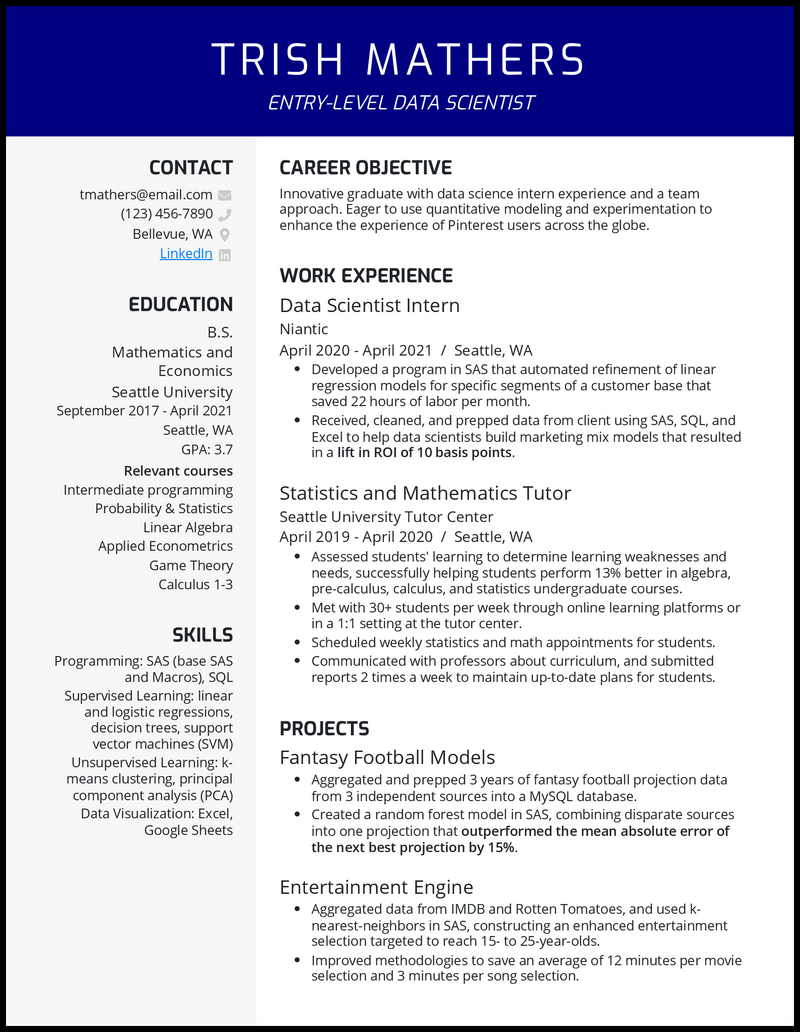A job-winning entry-level data scientist resume must function like a model—signal-rich, cleanly structured, and fine-tuned to surface relevant skills, precise results, and aligned keywords. Whether you’re a new graduate, fresh from a bootcamp, or pivoting from another field, confidently build a resume with labeled sections, bullet-pointed accomplishments, and metrics that matter.
You can also benchmark against resume samples built for impact and retrieval, and capitalize on tools like a cover letter generator to craft an application that no AI hiring system or recruiter can reject.
This guide presents:
- ↪ Five entry-level data scientist resume samples built for 2026 hiring trends
- ↪ Formatting tips that balance visual clarity with ATS compatibility
- ↪ Strategic advice on keyword use, metrics, and how to present projects and tools
Why this resume works
- Adding in any courses you’ve completed can not only flaunt your expertise but can also help you tailor your resume as close to the job description. Got any relevant courses? This is your sign to capitalize on them.
Related resume examples
How to Write an Entry-Level Data Scientist Resume

An entry-level data scientist resume should prove two things fast: you know the tools, and you can apply them. Your lack of direct experience notwithstanding, put your skills to show your capabilities, achievements that made impact, and a resume format that ticks all the boxes for applicant tracking systems (ATS) scrutiny and recruiters.
Before you can confidently submit your application, see what other resume templates for similar roles are doing, as well as check your resume to identify improvement opportunities and turn them to your advantage.
In this section, you’ll find:
- Must-have resume sections for entry-level data scientists
- How to phrase experience when you don’t have formal titles
- Structure tips that get your resume noticed
- Why and how to generate bullet points that blend expertise, numbers, and active verbs
- Tips to tailor your document to fit the job posting perfectly

What sections should an entry-level data scientist resume include?
For an entry-level data scientist resume that signals your technical readiness, project-based problem-solving, and familiarity with real-world tools, include the following sections:
- Contact Info
- Summary or Objective
- Projects or Experience
- Niche skills & Tools
- Education
- Certifications & Awards
- Optional sections: Extracurriculars, volunteer, and published work

How do you write a resume summary or objective for entry-level data science?
In a concise, impactful way, craft a resume summary of no more than two lines to showcase that you’re not just learning data science, but you’re already doing it. Strategically incorporate keywords that match job descriptions, highlight core tools, and provide proof of what you bring, not what you want.
Example of a good resume summary for an entry-level data scientist
Example
“Aspiring data scientist with Python, SQL, and scikit-learn experience. Built churn prediction and NLP models using real-world datasets, improving classification accuracy up to 87%.”
The above statement defines who you are, what you know (skills), what you’ve done and can do, and the impact you’ve made and can keep making.

How to present projects on an entry-level data scientist resume
Choose 2–3 of your most recent and relevant projects. For each one, include:
- A clear title and short context (such as Capstone, Kaggle competition, or freelance work)
- A technical overview: tools you used, models applied, and size of the dataset
- One or more concrete results—accuracy scores, reduced errors, business insights, or performance improvements
Example of an effective project entry
Credit Risk Prediction (Kaggle)
- Used XGBoost to predict credit risk for 10K loan record; raising F1 score to 0.83
- Built 12 new features in pandas based on domain knowledge, which helped reduce false positives by 117 cases
- Tuned hyperparameters using GridSearchCV, improving validation accuracy by 6%
Why this example works
- The problem is clearly stated
- Action taken and tools used are in the right place
- The outcome is quantifiable and logical

What is the best way to quantify metrics and impact in experience bullets?
Use numbers to underscor your impact in terms of the scope, speed, accuracy, efficiency, or value. Ensure every bullet answers at least one of these: How much? How fast? To what effect?
This formula sums it up: Active verb + skill/tool/software + measurable metric
When you use metrics, you make your skills credible, your resume scannable, and your value undeniable.
Example of impact-driven bullets for an entry-level data scientist resume
- Revamped model with GridSearchCV, shortening onboarding time by 13 minutes
- Processed 1.3M sets from 3 sources using PySpark, reducing ETL time by 48%
- Classified 10.4K+ support tickets with BERT, achieving 0.81 F1 score

How to build a skills section for an entry-level data scientist
Your resume skills section should be a punchy list of the unique abilities that make you stand out as an ideal hire—and it should be highly technical.
Name any programs you’re great at, and be as specific as you can. Data science recruiters already have a foundational understanding of what your job entails, so demonstrate you already know your stuff by arcing past the basics.
Go for the details. Recruiters expect you to know the fundamentals of programming and data analysis, so hone your edge: What languages or programs are you best at? We can’t stress specificity enough!
Take inspiration from these examples:
9 most popular entry-level data scientist skills
- MongoDB
- Spark
- PostgreSQL
- Decision Trees
- Logistic Regressions
- Base SAS / Macros
- K-means Clustering
- TextBlob
- Google Sheets

How to list skills, tools and technologies (Python, SQL, etc.) effectively
Group tools by type and avoid long, flat lists that blend everything. Organized categories make your skills scanable and ATS-compatible, making it easy to match them to job requirements. Your goal isn’t to show every tool you know by name, but to make your strongest ones pop from the haystack.
Example of how to break your skills into clear, labeled groups
- Languages: Python, R, SQL
- Libraries: pandas, scikit-learn, TensorFlow
- Tools/Platforms: Git, Tableau, AWS
- Techniques: logistic regression, clustering, NLP
Tips for building a skills section that commands attention
- Only include tools you have full practical knowledge of
- Use the exact tool names from job descriptions to improve ATS matching
- If your technical stack is your strongest asset, put the skills section just under your summary, above both the experience and education sections

Should you include coursework or certifications on a fresher data science resume?
Yes—especially if you have little or no formal experience. Coursework and certifications can be powerful assets in your resume when positioned strategically. They prove relevant training, technical range, and initiative without disguising themselves as job experience.
Where to place relevant coursework
Put it immediately under education, such as the example below:
Machine Learning, Data Structures, Statistics
Where and what are the criteria for listing certifications
Create a “Certifications” section after both the education and relevant courses sections, and include items only if they meet any of the following criteria:
- The subject matter directly matches the role’s required skills
- Recognizes a capstone, lab, or hands-on project
- The source is credible and an authority in the industry, good examples include Google, Coursera, DataCamp, and edX

How to structure an education section for entry-level data science roles
Your education section should should clealry establish your academic background in data science and its relevance to the role you’re applying for. Use a clean structure, with the following sections, to ensure it’s scannable for recruiters and ATS systems:
- Field of study
- Instition’s name
- Loaction
- The period you studied there
- GPA (if 3.5 or higher)
- Most recent coursework relating to the job
- Optional additions: Honors, research thesis title, and membership in student clubs & societies (only if they add value)
Example of an education section
Education
B.S. in Computer Science
University of Colorado Boulder
Boulder, CO | 2020–2024
GPA: 3.7/4.0
Key Courses: Algorithms & Data Structures, Probability & Statistical Modeling
Honors & Involvement: Teaching Assistant: Intro to Python Programming (Fall 2022)

What action verbs are effective in data science resumes?
The right verbs should emphasize your analytical thought process and the execution of ideas to achieve results. Use them in your bullet points to announce that you did the job and claim your rightful place in project execution.
Avoid empty phrases, such as “Assisted”, “Responsible for”, or “Helped” that add no value to your action but only fill up space.
Examples of action verbs for an entry-level data scientist resume
- Modeled
- Predicted
- Automated
- Scripted
- Engineered
- Tested
- Validated
- Evaluated

How to tailor your resume to a specific data science job description
Use the job ad as your writing blueprint. That way, you demonstrate your qualifications by speaking the employer’s language. Niche keywords and core skills position you as a frontrunner, making your resume ATS friendly and easy to review by humans.
Tailoring checklist
Here’s how to tailor your resume effectively:
- Use their keywords in your “Skills” section and project bullets to maximize ATS retrievability and recruiter alignment. For example, if the job advert says “predictive modeling,” don’t use “forecasting models.”
- Start with the most relevant bullets first. If the role emphasizes NLP and cloud tools, put those first.
- Align tools and niche: If they mention a specific tool, show how you’ve used it

How to handle limited or no professional experience
Surface relevant work from coursework, competitions, and personal projects; demonstrating real tools, real thinking, and real outcomes.
Derive value from the following:
- Convert coursework into impactful projects: Class assignments that used Python or pandas
- Perosnal and group projects hold immense power: Capstone, Kaggle, and open-source projects
- Present transferable skills that can make a difference in real-work situations: Competencies learned and applied in retail, Excel data modeling can become valuable assets
- Be creative with each section: Instead of “Experience”, go with “Projects”
Top 5 tips for your entry-level data scientist resume
- Shake up your experience
- Many in entry-level roles worry about sparse work history. But your experience doesn’t need to consist solely of jobs to boost your credibility. If you have outstanding (and relevant!) college projects, internships, or tutoring experiences, include them.
- Show depth of knowledge
- Demonstrate depth of knowledge in a specific area. Think “quality over quantity” when applying for an entry-level role, and provide a breakdown of your abilities when it comes to programming or data visualization.
- Organize your skills
- Following up on “depth of knowledge” a bit: Organize your skills by arranging them in specialized groups. If you’re excellent at handling Unsupervised Learning, then keep that subcategory of related technical skills together on your resume.
- Stress those tech specs!
- No, not the specs on your favorite devices. We’re talking about demonstrating your growing expertise by being specific about your technical skills. Name relevant programs clearly!
- Prioritize information over looks
- While it’s important to choose a modern resume template, stay professional. Keep everything well organized, and avoid zany colors or fonts! Recruiters are more interested in the data and details that show your skills.

What mistakes to avoid on entry-level data science resumes?
Avoid any of these mistakes:
- Paragraphs with no bullets
- Experience bullet without metrics
- Overloading the skills section with tools you only know by name
- Typos and formatting inconsistencies
- Ignoring keywords from the job description
Entry-Level Data Scientist Resume FAQs

When formatting your entry-level data scientist resume, ensure the outcome is concise, easy to read, and compelling for hiring manages to see your value immediately. You also have to use headings for sections and craft bullet points to list your work experiences.
By doing all these, you’re optimizing your resume for the online application tracking bots and real-life recruiters. Remember, the hiring team spends a few seconds deciding, so you should be very careful with how you format your document.
Part of your work will be supporting the senior staff to get work done, so you have to be a terrific team player. Another thing that will be your responsibility is reviewing large data sets to extract crucial information to make decisions.
Therefore, your attention to detail and analytical skills should be impressive. You’re not far from getting hired if you can showcase your ability to get work done and achieve results.
Entry-level data scientists should sport a one-page resume. This is typically enough to include your educational background, skills, and projects/internships. Going beyond one page is only suited for high-ranking professionals with extensive work experience.










